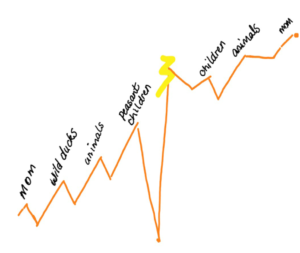Today’s story structure is a little more balanced, and is illustrated by the Ugly Duckling story.
The Prompt
Use the Ugly Duckling Story To Write A Balanced Story With The Life-Changing Moment In The Middle

Unlike in Cinderella, the Ugly Duckling’s life-changing moment comes in the middle, and then the author spends the second half of the story revisiting situations like the ones that led him to the crisis point. Where he met cruel children at the start, he meets nice children after his transformation. Where he met mean animals at the start he meets kind animals after his transformation. Where his family was horrible to him at the beginning, he gets to reconcile with his mother at the end.
This means we get to see what kind of character the Ugly Duckling has even after his transformation. This structure is a good one to use when your character’s struggle is mostly internal.
To make life easier for yourself, unfold the story in the opposite order to the way you built it. Nest the encounters, like this:
[mother] [animals] [children] [CRISIS] [children] [animals] [mother]

I had a really cool idea for today’s prompt that had to do with using the Ugly Duckling structure to move the character through time, which had her encountering her younger self, told from the younger self’s POV and then, after the “fulcrum moment,” had the POV flipping and…yeah it was complicated. It was time paradoxical. It probably doesn’t quite make sense. In any case, it’s drafted! And might be something I can make something of at a future date!
Finally had a nice block of time to write instead of having to squeeze an hour in during the workday. I followed the prompt very closely.
The story was about a high school student who was a real slob, not really caring how he looked (and feeling fairly self-righteous about it too, considering all those who do care about such things to be superficial).
Anyway it’s the last day of school his junior year, and his poor self-care leads to some embarrassing moments involving his mom, his classmates, and a girl he likes. To make matters worse, after school his mom says he can’t hang out with friends that summer unless he finds a job. So he scrambles looking for one, finally landing a job stocking shelves at a high-end men’s clothier.
This turns out to be a blessing in disguise – the store owner becomes a mentor for him, teaching him how to take better care of himself. He develops an appreciation for style and becomes more confident. When school starts back up next year, all three parties (his mom, his classmates, the girl he likes) are blown away by his transformation.
Having the structure in place really helped me stay on track with this story. However, I will say that endurance was a limiting factor – after about 2.5 hours of straight writing I was ready to wrap things up and kind of stumbled across the finish line. It’s not that I was out of ideas, I was just exhausted. I’d like to be able to write for longer blocks of time in the future, as I do feel like the first 30 minutes or so are usually spent shaking off cobwebs so longer blocks would be more efficient… if anyone has any tips on how to write longer I’d appreciate them!
Like you, I stumbled across the finish line on this one too! Work today plus an upcoming deadline for which I need to edit another piece made for a bit of a hand wavy ending.
wrt writing longer, for me, on days when I need to write a lot, it’s about taking regular breaks. This is something I learned a bunch of years ago. We really only have the capacity to focus intensely for 15-20 minutes. After that, we take a break, even if it’s just staring into space for a moment or two before going back to the task at hand. I find with writing, if I really want to get things done, a 20 minutes on, ten minutes off pattern allows me to keep going for much longer. If I don’t take those breaks, then I will need to tap out after two or three hours.
An alternative is breaking up the writing session–two hours in the morning, an hour and a half in the afternoon, another hour or two after dinner. Sometimes that can help.
Thanks so much for the suggestions!
Yeah, I’ve got no advice here. I love to binge, but end up getting exhausted too. I know there’s all that Pomodoro productivity stuff out there, but I don’t know that it works for creative work because of the aforementioned cobweb time. I do know that building up your stamina by doing this often does help. I have found that squeezing in two writing blocks at different times of day can help too. if I can write first thing, and then come back to it hours later, after attending to all my other obligations, can help. Especially if those obligations are not computer/desk based.
Got today’s story done earlier. Combined it with this week’s Stream of Consciousness Saturday prompt, too.
https://fallonbrownwrites.wordpress.com/2018/05/12/socs-story-a-day-day-12-the-ugly-duckling/
Professional “Book Doctor” Stuart Horwitz shares some great insights in his book “Blueprint Your Bestseller,” using the Ugly Duckling as his main example. Highly recommended resource.
I love Stuart. I should really credit him in this, because I’m sure he’s the only reason I ever read the original version of this story. Buy his books, folks!